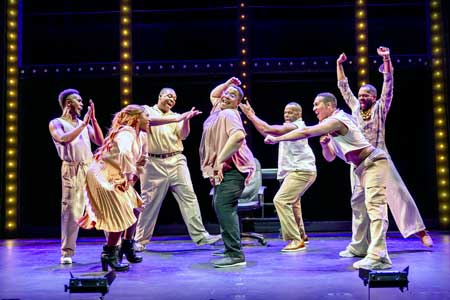Musical (2019)
Book, Music and Lyrics by Michael R. Jackson
Directed by Maurice Emmanuel Parent
Music Direction by David Freeman Coleman
Speakeasy Stage Company and
Front Porch Arts Collective
Boston Center for the Arts
South End, Boston
April 26 – May 25, 2024
Choreography: Taavon Gamble; Scenic Design: Jon Savage; Costume Design: Becca Jewett; Lighting Design: Brian J. Lilienthal; Sound Design David Remedios
With Kai Clifton (Usher), Grant Evan (Thought #1), Davron S. Monroe (Thought #2), Jonathan Melo (Thought #3), Aaron Michael Ray (Thought #4), De’Lon Grant (Thought #5), Zion Middleton (Thought #6)

“Drawing Hands” (1948)
All we know him as is Usher because that’s what he does – he’s an usher at a Disney Theater – but his dream is to be an author of a musical. In trying to realize this dream, Usher has a lot of dealings with six personified Thoughts who give him all sorts of feedback, flack, criticism, teasing, brutal undercutting and occasional encouragement. Usher is black, gay and considerably overweight and has a lot to deal with in terms of frustration regarding desire and sexual fulfillment, much of which gets run though his thought machine. The Thoughts morph into all shapes and types, sometimes in the role of parents, sometimes in the role of lovers, and sometimes in the role of agents and producers. Amazingly, this psychological and emotional grab-bag all comes together into a coherent narrative that is both moving and entertaining.
The title of the musical comes from Douglas Hofstadter, author of numerous books about logic, computation and selfhood, including the popularly received Gödel, Escher, Bach (1980), and a later elaboration on similar themes, I Am A Strange Loop (2007). In these and other works, Hofstadter identifies the oddity of the notion of self, which, in his model, derives from a looping of thoughts back onto themselves in such a way that consciousness emerges. This self-referential account of mind fits perfectly with the premise of this musical which features Usher as a character in a musical about writing a musical in which he is the main character. Get all that?
This rather logically heady way of thinking about selfhood might lead one to believe that this show is an indulgence in mind games and brain twisters, but it is not that at all. In fact, despite the rationalistic overtone of the title, much of the narrative in the show is about sexuality. Though Usher confronts his sexuality through his Thoughts – through verbal interaction with the six conceptual muses who attend him – his process of dealing with them is much more visceral than cerebral.
Numerous themes that outline Usher’s dramatic challenges come through and get interwoven in the series of interchanges, and through the series of musical numbers that accompany them. The complexity of relations with his father and his mother take on primary significance, and the renditions of his parents are as hilarious as they are heartbreaking. Usher’s father – at least in Usher’s thoughts – is alcoholic, homophobic, distant, yet has enough love for his son to help prod him along the path of what he perceives as fulfilling his son’s dreams. Though expressing affection, Usher’s mother is assertive and powerfully Christian, seeking at every turn to not see what Usher wants to do, choosing instead to urge Usher, insistently, to do something like write a Gospel play and do it more in the mainstream image of Tyler Perry than as some fringe theatrical deadbeat.
In fact, one of the very funny and down-to-earth elements in the narrative is the frequent allusion to Tyler Perry, the incredibly rich and powerful black entertainer who represents the Godhead of success to Usher’s mother and the exact opposite to Usher who wants to write significantly from the heart, not superficially for the pocketbook.
Various agents and editors show up along the way in Usher’s Thought-mobile, most of whom represent crass and commercial points of view. But there is one of them who does offer coherent, supportive and helpful advice to Usher, and the moment of his encounter with that thought-character stands out in its purity and significance.
This concern with realizing the dream of writing A Strange Loop merges with a lot of agitated thought about sexuality. Fantasies of having wild sex with any number of men erupt constantly; the dynamic staging and choreography that prevail throughout the production manages to keep these seemingly endless repetitions of various sex fantasies fresh and vivid.
The lyrics, throughout, are dense and entertainingly packed with all kinds of odd tidbits, many of which sail by but which collectively exhibit the richness of the writing. Everything comes into play here, and the liberality with which author Michael R. Jackson has put together his walls of words and his shamelessness in talking about anything and everything makes for a rich depiction of Usher’s character.
The music is not bad but somewhat more routine, managing certainly to convey the lyrics adequately, and occasionally managing to rock out sufficiently well to produce a real sense of excitement. There are numerous numbers in which the entire company belt it out and transform what might have been a series of self-absorbed fantasias into rousing celebrations. Overall, the music, directed by David Freeman Coleman, is very well played and sung, and the choreography by Travon Gamble is distinctively capable and appealing.

with Company of “A Strange Loop”
Photo: Maggie Hall Photography
Courtesy of Speakeasy Stage Company and
Front Porch Arts Collective
In the title role, Kai Clifton is wonderful – perfectly vulnerable, frazzled, intense, imperfect, shamed, shamefully bold, resolute, humble, sensitive, frayed. The entire show is built upon his character’s shoulders and Clifton commands the stage with authority, even though the character he portrays is filled with uncertainty. Clifton renders a deep evocation of the vulnerability at the core of Usher’s character and exhibits it authentically. It’s an excellent performance.
As the six Thoughts, Grant Evan, Davron S. Monroe, Jonathan Melo, Aaron Michael Ray, De’Lon Grant and Zion Middleton are each wonderful in their own ways, and together they form a robustly integrated and engaged company. They carry off their multiple personas with grace and versatility, and function in a coordinated and effective way to convey the psychological and emotional drama surrounding Usher.
Director Maurice Emmanuel Parent, also well-known for many years as a talented actor on the Boston stage, has done an exquisite job bringing this show to life.
A surprise guest at the performance I happened to attend was no other than the author, Michael R. Jackson, who gave a wonderful, heartfelt and appreciative set of remarks after the show, indicating that this was the first production that he had had no hand in realizing. He seemed genuinely moved by this rendition of his work, indicating that though it was a new experience for him to see it beyond the orbit of his own grasp that this production realized his artistic intent movingly and well.
Indeed, this is an excellent production and one well worth seeing.

“Bond of Union”, 1956
Some additional notes on the various musical numbers:
Intermission Song
Great choreography evident from the outset. Oh, my God! sung over and over – terrific.
Today
Usher: I am a Disney usher… – says it all.
We Wanna Know
Call from Usher’s mother on the phone. You gonna write me a Gospel play? she asks, adding “…unless you don’t love your Momma, or the Lord!” Priceless.
Inner White Girl
Usher muses on his attachment to singers Tori Amos, Joni Mitchell and Liz Phair, who actually wrote a song called Strange Loop. Somehow the memorable and funny line Fuckability is still the life blood of the theater… gets added in.
Didn’t Want Nothin’
A heartbreaking call to Usher from his father, personified by all of the Thoughts holding liquor bottles brown bags. And then, a meeting between Usher and his doctor – still in thought only – and the doctor prescribing More Sex for Usher. Hilarious.
Exile in Gayville
Online dating, with all of its perils. Usher meets his ideal lover, still in thought only.
Second Wave
A reference to Betty Friedan’s scowl – funny. Usher refers to the second wave feminist within who is a at war with the dick-sucking black gay man in himself. Amid this sweet, sad ballad, one of the great lines: They don’t get AIDS, they’re taking Truvada, I just sit aside and say Nada.
Tyler Perry Writes Real Life
As the Tyler Perry issue comes up, the Thoughts emerge in personifications of great black heroes in rebellious response. I’m Harriet Motherfucker Tubman she says as she strolls out, followed by Jimmy Baldwin and others.
Writing a Gospel Play
… because that’s what the people want. Or is it?
A Sympathetic Ear
One of the Thoughts representing a truly kind and responsive editor, a woman who really wants to know what Usher’s project is about. Another interaction between Usher and his father. You’re looking for love, son? Well, your Mom’s not here, Daddy says coldly. But then Usher describes his project to his father: I’m writing a musical about a young man who’s writing a musical. Wonderfully bold, and the knot twists.
Boundaries
After sex, Usher feels shame – why did I do that? A plaintive solo, with sweet singing by Kai Clifton.
Periodically
Call to Usher from his mother, riddled with such choice guilt-inducing lines as Hours of labor to bring you along… and Don’t put Jesus behind you and Hell is real!
Precious Little Dream / AIDS is God’s Punishment
Usher delivers a strong, angry speech to his father, with clear and honest revelations: That, in a nutshell, is my personal life! And Usher’s mother puts in: Why do you hate us?, all followed by Usher coming out adorned in a whole series of different women’s dresses. And then a scene with Tyler Perry, a casket and a funeral, replete with a pastor intoning AIDS is God’s punishment.
Memory Song, A Strange Loop
A very funny finale, with Usher asking Do you just want to go on like this? These people – pointing to the audience – aren’t going to wait forever. Very funny indeed. And then, the recognition that it is the self that won’t accept things, won’t let the agony be and Usher realizes that the only problem is with his perception of that personal pronoun – I – and what he needs to do to coexist with it, to let down his own repeated self-incrimination.
– BADMan (aka Charles Munitz)
Leave a Reply